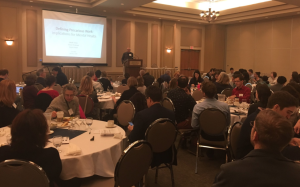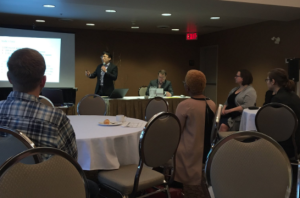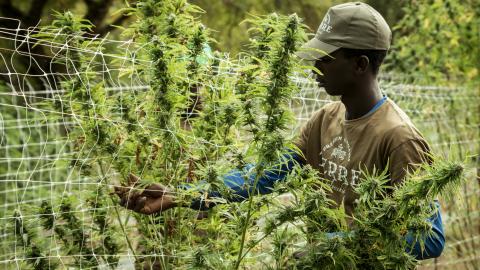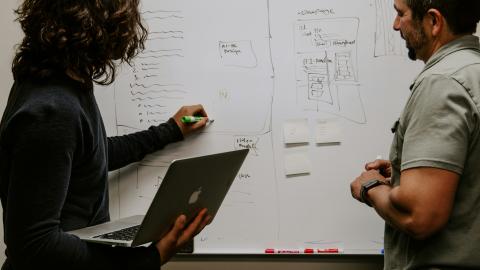
January 25, 2018

Cascadia 2018 conference.
Northwest Center ERC Faculty member, Dr. Noah Seixas, gave the keynote Bates Lecture kicking off the annual conference. Noah's talk, "Defining Precarious Work: Implications for Mental Health", focused on how precarious work situations, ranging from insufficient hours, to hazardous conditions, to sexual harassment impact the mental health of workers and thus their overall health.
Dr. Seixas emphasized that there are strong connections between quality of work, socioeconomic factors, and mental and physical health, and that certain groups are disproportionately impacted by precarious work conditions and their economic and health-related consequences.
UW DEOHS Research Coordinator, Hannah Curtis, also presented at this year's conference, sharing her work with Dr. Seixas on the Safety and Health Empowerment for Women in Trades (SHEWT) project. Hannah discussed gender-related stressors for women in construction, and the mental health implications of working in a uniquely male-dominated industry.

"I have been doing this a long time. It has gotten better, but so much of the stress is covert, hard to pin down. The harassment never really stops; you learn to ignore it...Men don't want us there so it is a constant, unstated hostile environment" read a quote shared by Hannah in her presentation.
Hannah shared with the conference attendees that women make up only 3% of the trades workers in the construction industry, and that while improvements have been seen the industry still has a long way to go in breaking down the prevalent "macho" culture.
Throughout the two days of the conference, researchers from all of the participating universities shared their fascinating research in the areas of environmental, occupational, and population health.

Richard Evoy, a student at Oregon State University, tested end user cannabis products for the presence of harmful pesticides. Shockingly, Evoy and his team found pesticides that "have no business being in products that are inhaled or eaten" in some of the tested batches.
Evoy discussed the challenges commercial marijuana producers face in terms of pesticide use, and shared that he plans to further examine how these harmful chemicals are making into end-user products and how we can help growers prevent dangerous exposures for consumers and workers.
Kelvin Choi, University of British Columbia, examined how workplace violence played a role in return-to-work for health care workers in British Columbia.

Choi found that 3 out of 10 health care workers who suffered mental health injuries due to a violent workplace incident do not return to work. He also found that counselors and social workers injured in a workplace violence incident were slower to return to work than other health care workers included in his study.
As is tradition, students who participated in the conference received awards for their posters, ignite presentations, and break-out session presentations. Some of the award winners included:
Battsetseg Ulziikhuu, from Simon Fraser University. Battsetseg gave an ignite presentation on prenatal exposures to air pollutants and susceptibility to Autism Spectrum Disorder among a population in Mongolia. Ms. Ulziikhuu explained that unique style of dwelling commonly found in Mongolia, coupled with increased air pollution in the region, may be related to increases in children diagnosed with Autism Spectrum Disorder.

Brian Chin, University of Washington, received an award for his ignite presentation on best practices for Physical Therapy services among injured workers with low back pain.
Richard Evoy, OSU, was also honored for his break-out session presentation on pesticides in commercial cannabis products in Oregon.




